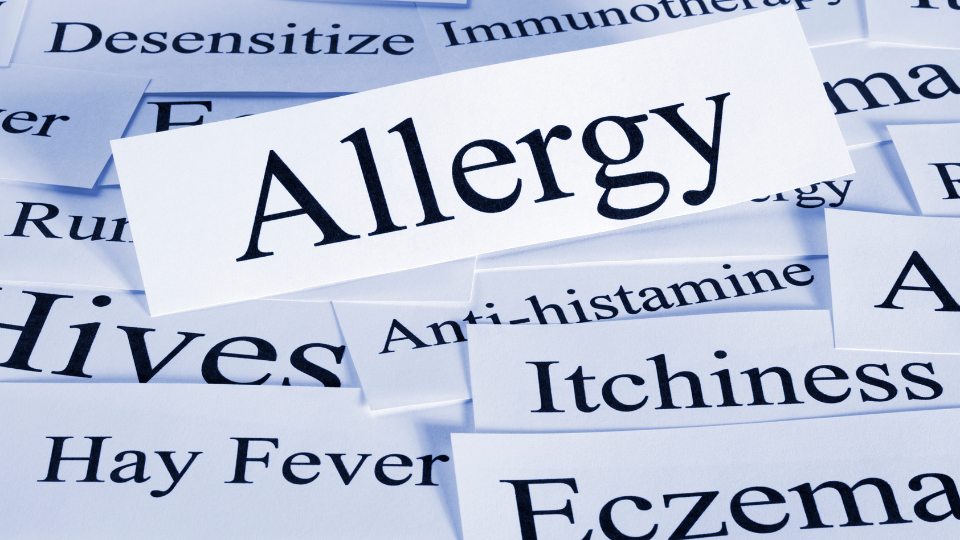For some hay fever sufferers, they will already be in the midst of allergy season at the moment if they have tree pollen allergies (March-May), but for the rest, spring comes with a sense of dread as the grass pollination season (May-July) begins. You can also be allergic to weed pollens whose season can continue as late as October.
Symptoms are due to your immune system in the lining of the nose and eyes overreacting to the pollen and releasing a chemical called histamine which causes inflammation in the nose (rhinitis) and eyes (conjunctivitis). Sometimes the sinuses are throat can be affected. Common symptoms of hay fever are runny, itchy/blocked nose, sneezing, itchy eyes, scratchy throat and the feeling of a constant ‘summer cold’ from sinus congestion.
What is hay fever?
Hay fever is also known as seasonal allergic rhinitis: seasonal because it happens at the same time each year / allergic because it is caused by your immune system / rhinitis meaning inflammation of the nose.
It is a really common condition affecting 1 in 5 people, with grass pollen being the commonest allergen. Hay fever tends to run in families and it can be connected with other allergic/atopic conditions such as asthma and eczema. It often develops in school age children and in the teens, and can have a significant impact on performance at GCSE’s and A’-levels during peak season. Sometimes symptoms can be so bad that they interrupt sleep which has a knock-on impact on the follow day’s productivity and ability to concentrate.
Most sufferers diagnose hay fever themselves though having typical symptoms during the hay fever season. A medical diagnosis can be made through Skin Prick Testing or blood testing which you can read more about here.
Avoidance is the key!
Although it is impossible to completely avoid pollens in the air, if you are able to reduce pollen exposure by the following tips, your symptoms should reduce:
- Monitor pollen forecasts daily and stay indoors whenever possible is the count is high
- Wear wrap-around sunglasses when outside to prevent pollen going in to the eyes
- When coming inside from being outdoors, change your clothes at the door and wash your face especially any facial hair that could have trapped pollen
- Keep your bedroom window shut so no pollen gets inside as you spend 7+ hours in there!
- Spread a nasal balm around both nostrils to trap any pollen
- Keep car windows closed as pollen counts are high along roads with grass verges
- Avoid freshly cut grass / large grassy places like commons. Sea breezes blow pollen in land so consider a trip to the coast instead of a rural location!
- Do not keep fresh flowers in the house
- Avoid smoke where possible as this can make symptoms worse
- Don’t dry washing outside as they trap pollen
Over the counter and prescription medications
Anti-histamines – these work by blocking the allergic response. There are several brands available over the counter and you should take the once daily form that is non-drowsy. Sometimes these are all that is required if symptoms are mild. Some prescription-only antihistamines are available through your GP or Consultant Allergist.
Nasal sprays – these are often steroids that work by reducing inflammation in the nose as well as anti-histamines. Nasal sprays will often also help control eye symptoms as well.
Eye drops – these can be effective if taken regularly throughout the day starting before you leave the house so before symptoms start.
What other Allergy treatment options are there?
Immunotherapy – also known as desensitisation treatment is a treatment that causes tolerance to an allergen by blocking and then switching off the immune system to that specific allergen e.g. grass or tree pollens. There are 2 types available – sub-cutaneous (injection) or sub-lingual (tablet/drop under the tongue). The injections initially are weekly, but the sub-lingual option can often be taken at home each morning. The clinical effect is seen within the first year, but for maximal effectiveness it should be continued for 3 years to prevent relapse in symptoms, and therefore cost and convenience of this long-term treatment are major factors for consideration.
Rhinolight – this is the latest medication-free treatment for nasal symptoms of hay fever and we are proud to be the only UK clinic offering this to patients at ROC. It is a light treatment up both nostrils for only 3 minutes, 6-8 times over 2-3 weeks at your convenience. It works in a similar way to an anti-histamine by stopping the allergic response in the nasal lining. I have found the most immediate result is stopping people sneezing after even the first treatment! Like immunotherapy, the course is likely to need repeating each year at the start of the season for 3 years.
Want to discuss concerns about allergies? Get an appointment with one of our doctors!


